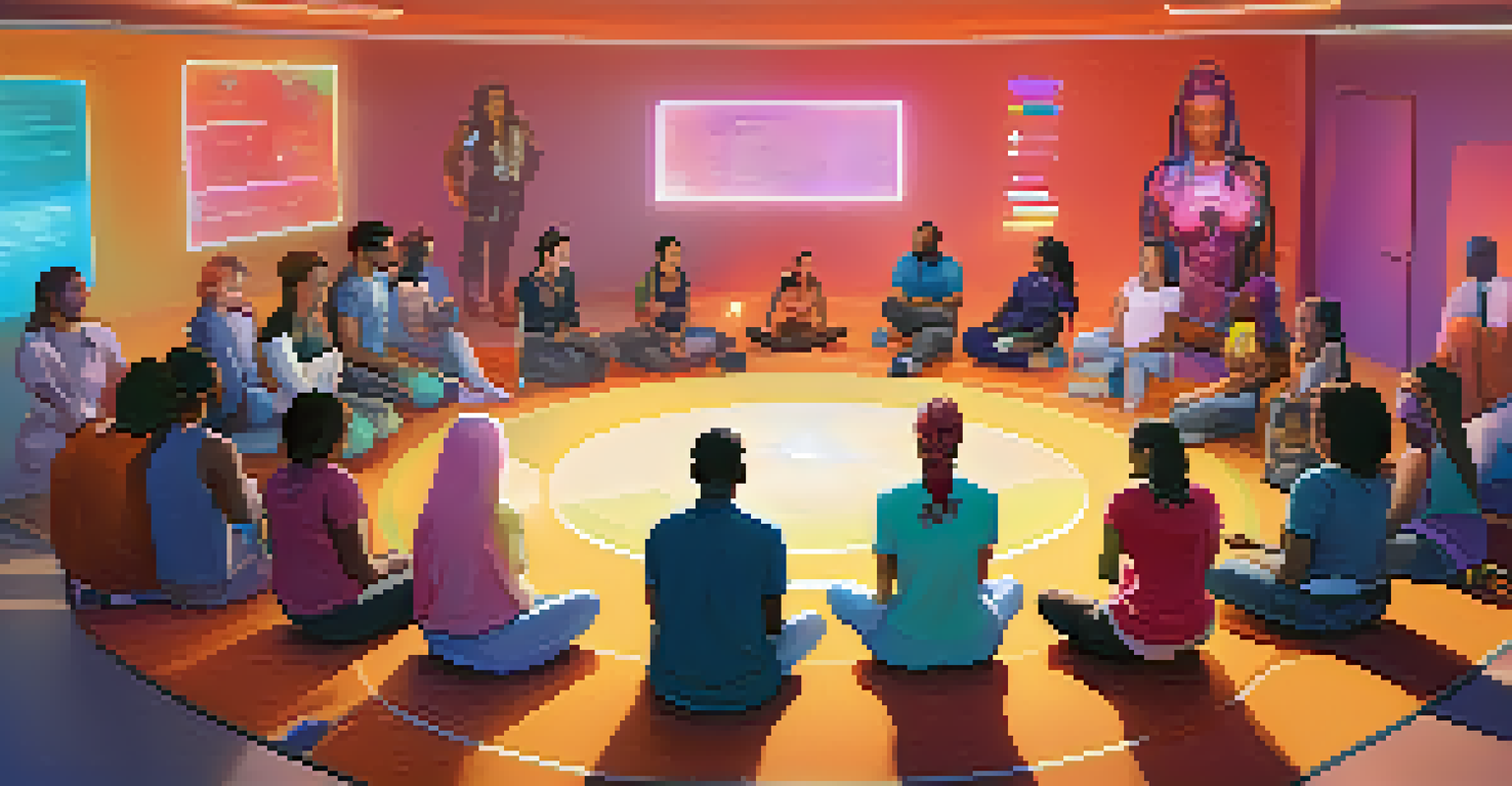Virtual Reality: A New Tool in Addiction Recovery Methods

Understanding Addiction and Its Challenges
Addiction is a complex condition that affects both the mind and body. It can stem from various factors, including genetics, environment, and psychological issues. Understanding these underlying challenges is crucial for effective recovery, as traditional methods may not address all aspects of an individual's struggle.
Addiction is a condition that affects not just the body but the mind, and understanding this duality is essential for effective recovery.
Many individuals battling addiction often face stigma, isolation, and emotional turmoil, which can hinder their recovery journey. This is where innovative approaches, like virtual reality (VR), come into play. VR can help create a safe space for exploration and healing, allowing users to confront their challenges in a controlled environment.
By simulating real-life situations that trigger cravings or anxiety, VR offers a unique way to practice coping strategies. This immersive experience can lead to a greater understanding of their addiction and provide essential tools for dealing with triggers in the real world.
What is Virtual Reality in Addiction Recovery?
Virtual reality is a technology that creates a simulated environment, allowing users to immerse themselves in a computer-generated world. In the context of addiction recovery, VR can replicate scenarios that individuals may encounter in everyday life, helping them develop essential coping mechanisms. Think of it as a training ground for the mind, preparing individuals for real-world challenges.

Through VR, users can engage in guided sessions that focus on mindfulness, stress reduction, and exposure therapy. These experiences can be tailored to each person's specific needs, making recovery more personalized and effective. For example, someone recovering from alcohol addiction might face social situations in VR where alcohol is present, helping them practice refusal skills.
VR Creates Safe Spaces for Healing
Virtual reality provides a controlled environment for individuals to confront their addiction challenges and practice coping strategies.
The adaptability of VR technology means that it can be integrated into various treatment plans, whether in individual therapy or group settings. This flexibility allows for a more comprehensive approach to addiction recovery, making it easier for individuals to find methods that resonate with them.
Benefits of Using VR in Addiction Treatment
One of the most significant benefits of virtual reality in addiction treatment is its ability to create a safe and controlled environment. Users can practice their coping strategies without the real-world risks associated with exposure to triggers. This controlled setting fosters a sense of safety, encouraging individuals to confront their fears and challenges head-on.
The future belongs to those who believe in the beauty of their dreams, and innovative technologies can help us dream of recovery.
Moreover, VR can enhance engagement and motivation during the recovery process. The immersive nature of the technology can make sessions feel less like traditional therapy and more like an interactive experience. This can lead to increased participation and a stronger commitment to recovery.
Additionally, the data collected during VR sessions can provide valuable insights for therapists. With the ability to track responses and progress in real time, mental health professionals can tailor their approaches more accurately, ensuring that treatment is effective and responsive to each person's journey.
Successful Case Studies of VR in Recovery
Numerous case studies have highlighted the effectiveness of virtual reality in addiction recovery. For instance, a group of researchers found that individuals who participated in VR therapy reported lower cravings and increased confidence in their ability to resist temptation. These promising results demonstrate the potential of VR as a valuable tool in the recovery toolkit.
In another study, participants using VR to simulate social situations with alcohol reported a significant reduction in anxiety and stress levels. By practicing refusal skills in a safe environment, they felt better prepared to handle real-life situations, showcasing how VR can bridge the gap between therapy and real-world application.
Engagement Boosts Recovery Efforts
The immersive nature of VR enhances motivation and participation in addiction recovery, making therapy feel more interactive and engaging.
These case studies not only underline the efficacy of VR but also inspire hope for those struggling with addiction. They highlight that recovery doesn't have to be confined to traditional methods; instead, innovative approaches like VR can pave the way for new possibilities and success stories.
Potential Limitations and Considerations
Despite its many benefits, virtual reality is not without limitations. For one, not everyone may respond positively to VR therapy; some individuals might experience discomfort or motion sickness while using VR headsets. It's essential for therapists to assess each person's comfort level and medical history before incorporating VR into their treatment plan.
Moreover, access to VR technology can be a barrier for some individuals. While the cost of VR equipment has decreased, it may still be prohibitive for certain populations. Ensuring equitable access to this technology is crucial for it to be a viable option in addiction recovery.
Lastly, while VR offers innovative tools for recovery, it should not replace traditional methods entirely. Instead, it should complement existing therapies, providing a well-rounded approach to addiction recovery that includes a variety of techniques to meet individual needs.
The Future of VR in Addiction Recovery
As technology continues to advance, the future of virtual reality in addiction recovery looks promising. Researchers are exploring ways to enhance the VR experience, making it even more realistic and beneficial for users. This could involve integrating biofeedback mechanisms, allowing users to see their physiological responses during VR sessions, providing even deeper insights into their emotional states.
Moreover, the potential for VR to foster support networks is also exciting. Imagine a virtual support group where individuals can connect with others in recovery, sharing experiences and encouragement in a safe space. This could help combat the feelings of isolation often experienced during recovery, creating a sense of community.
Case Studies Show VR's Effectiveness
Research indicates that VR therapy can significantly reduce cravings and anxiety, demonstrating its potential as a valuable tool in addiction recovery.
Ultimately, as we learn more about the effectiveness of virtual reality in addiction recovery, its integration into treatment programs may become more widespread. By embracing new technologies, the mental health field can offer more diverse and effective options for those seeking to overcome addiction.
Getting Started with VR for Addiction Recovery
If you or someone you know is interested in exploring virtual reality as part of addiction recovery, the first step is to consult with a mental health professional. They can provide guidance on whether VR is a suitable option based on individual needs and circumstances. It's essential to work with someone who understands both addiction and the technology involved.
Many treatment facilities are beginning to incorporate VR into their programs, so researching local options can be beneficial. Some therapists may even offer VR experiences as part of their practice, allowing clients to engage in this innovative approach to recovery.

Finally, staying informed about developments in VR technology can also be helpful. As this field evolves, new applications and tools will likely emerge, broadening the horizons of what virtual reality can offer in the realm of addiction recovery.